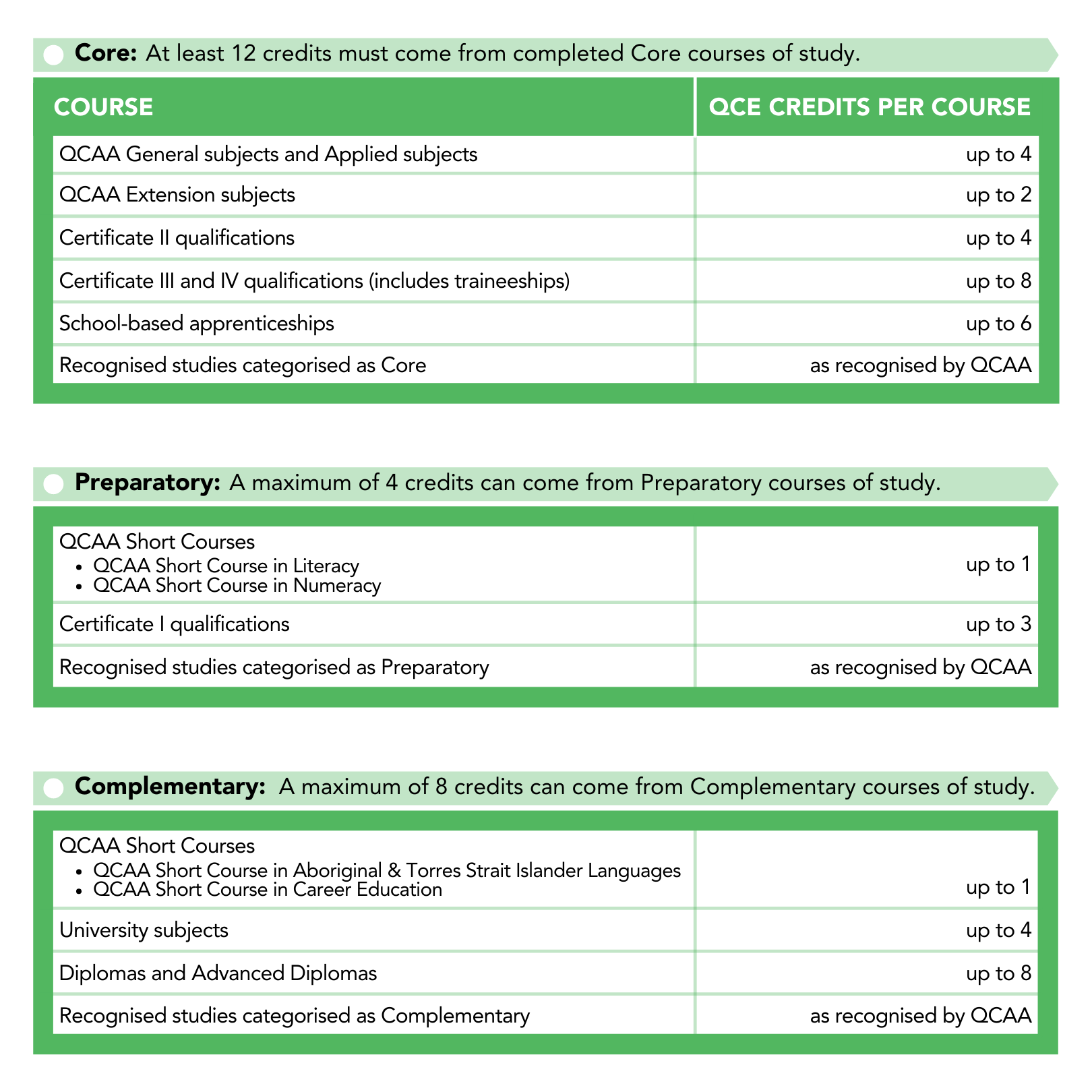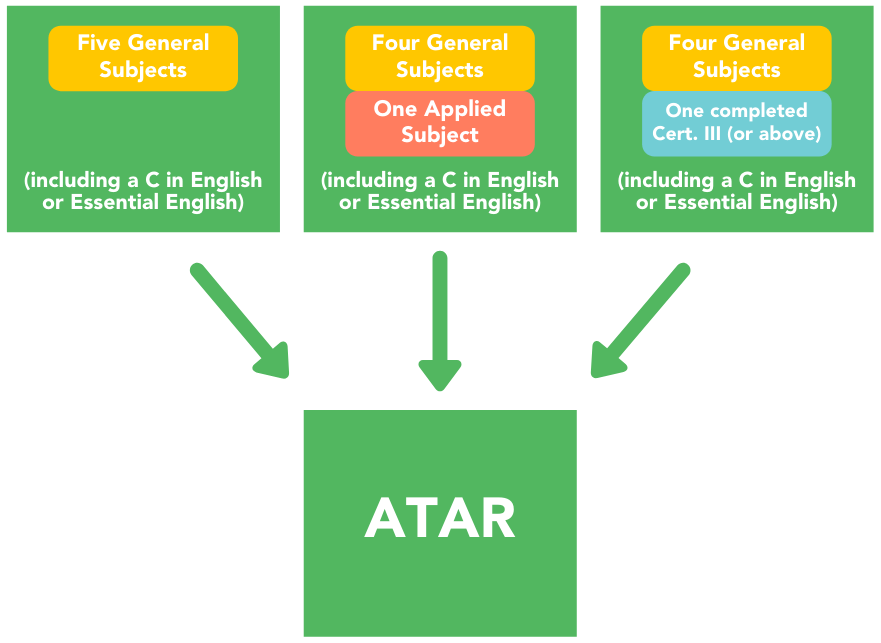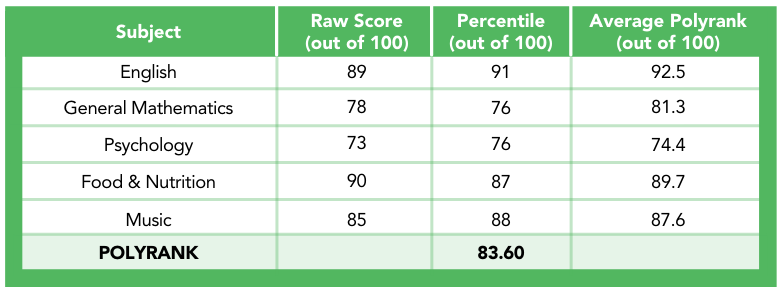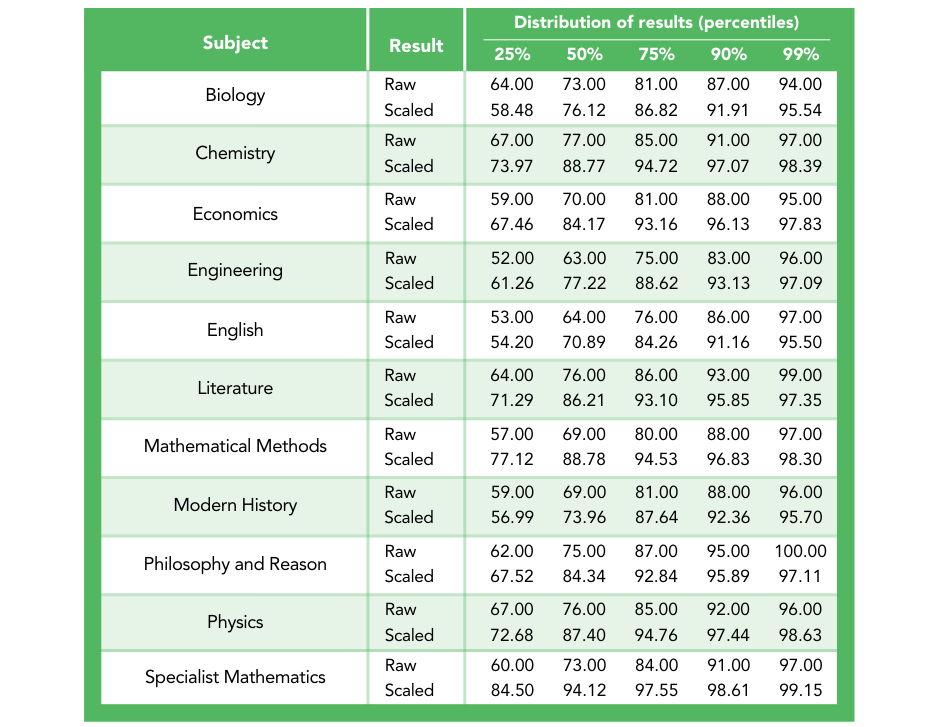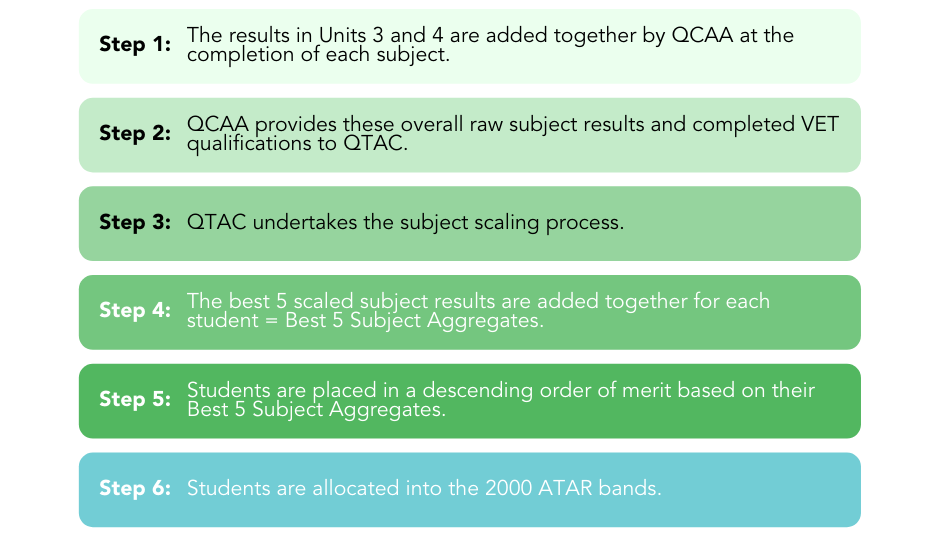Are you working towards an Australian Tertiary Admission Rank (ATAR) through the QCE? With the ATAR QLD having only been introduced in 2020 in Queensland (QLD), you might have some questions about how the system actually works.
We’ve got you covered! We’ll guide you through the different types of subjects you can choose from, how internal and external assessments work, scaling and moderation, and everything else you should know.
Read on to find out more about the ATAR in QLD!
How does the QCE work?
What is the QLD ATAR?
What are the different QCE subjects?
Which subjects apply for an ATAR in QLD?
What assessments count towards my ATAR in Years 11 and 12?
What is inter-subject scaling?
How is the QLD ATAR calculated?
What is the difference between the QLD ATAR and OP?
How does the QCE work?
In order to attain a Queensland Certificate of Education (QCE), students must achieve 20 credits of learning, following the set standard, set pattern and satisfying literacy and numeracy requirements.
The 20 credits can come from:
- QCAA-developed subjects or courses
- Vocational education and training qualifications
- Non-Queensland studies
- Recognised studies
The set standard equates to satisfactory completion, achieving a grade of C or higher, competency or qualification completion, pass or equivalent.
To fulfil the set pattern means to complete 12 credits of Core Courses as well as 8 credits from:
- Core
- Preparatory (max. 4)
- Complementary (max. 8)
What is an ATAR?
The ATAR, otherwise known as the Australian Tertiary Admission Rank, which was recently introduced in Queensland, provides a standardised system that indicates your rank and overall academic achievement, in relation to other students.
ATARs can range between 0.00 and 99.95, with increments of 0.05.
Just remember, it’s a percentile rank — not a mark. So if you manage to achieve an ATAR of 80.00, this doesn’t mean that your results equate to 80%. The ATAR demonstrates that you’ve placed in the top 20% of students in Queensland in your Year 12 cohort.
The ATAR is typically used to assist universities with selecting students for their courses. For example, a university may require an ATAR of 75.00 for a humanities degree — for guaranteed entry into the course, you’ll need an ATAR of 75.00 or above.
The Queensland Tertiary Admissions Centre (QTAC) is responsible for determining the ATARs of students across Queensland.
Curious about how your school ranks in terms of ATAR results? Check out our list of Brisbane’s top co-ed and single sex schools to compare!
What are the different subjects?
There are 5 subject types that students can choose from in order to achieve a QCE. These include:
QCAA General Subjects (Core)
These subjects set students up for tertiary study, further education and training and employment. Each subject may contribute up to four credits towards a QCE, as well as an ATAR in QLD.
Here are the various subjects you can study:
| Subject Areas | General Subjects |
|---|---|
| English | - English (4 credits) - English and Literature Extension (2 credits) - English as an Additional Language (4 credits) - Literature (4 credits) |
| Health and Physical Education | - Health (4 credits) - Physical Education (4 credits) |
| Humanities and Social Sciences | - Aboriginal & Torres Strait Islander Studies (4 credits) - Ancient History (4 credits) - Business (4 credits) - Economics (4 credits) - Geography (4 credits) - Legal Studies (4 credits) - Modern History (4 credits) - Philosophy & Reason (4 credits) - Study of Religion (4 credits) |
| Languages | - Chinese (4 credits) - Chinese Extension (4 credits) - French (4 credits) - French Extension (4 credits) - German (4 credits) - German Extension (4 credits) - Italian (4 credits) - Japanese (4 credits) - Spanish (4 credits) |
| Mathematics | - General Mathematics (4 credits) - Mathematical Methods (4 credits) - Specialist Mathematics (4 credits) |
| Sciences | - Agricultural Science (4 credits) - Biology (4 credits) - Chemistry (4 credits) - Earth & Environmental Science (4 credits) - Marine Science (4 credits) - Physics (4 credits) - Psychology (4 credits) |
| Technologies | - Aerospace Systems (4 credits) - Design (4 credits) - Digital Solutions (4 credits) - Engineering (4 credits) - Food & Nutrition (4 credits) |
| The Arts | - Dance (4 credits) - Drama (4 credits) - Film, Television & New Media (4 credits) - Music (4 credits) - Music Extension (Composition) (4 credits) - Music Extension (Musicology) (4 credits) - Music Extension (Performance) (4 credits) - Visual Art (4 credits) |
The following are prerequisites for Extension subjects:
| General subject: Units 1 & 2 (Prerequisite to the Extension subject) | General subject: Units 3 & 4 (May be studied with or before Extension subject) | Extension subject: Units 3 & 4 only |
|---|---|---|
| English | English | English & Literature Extension |
| Literature | Literature | English & Literature Extension |
| Chinese | Chinese | Chinese Extension |
| German | German | German Extension |
| Music | Music | Music Extension |
Sourced from QCAA
QCAA Applied Subjects (Core)
If you choose to study Applied Subjects, these have a greater focus on practical skills. Students can work towards further education and training, and employment.
Again, each subject may contribute up to four credits towards a QCE. Though if you would like an ATAR in QLD, you may only study one Applied subject, alongside four General subjects.
These are the different subjects you can select from:
| Subject Areas | General Subjects |
|---|---|
| English | - Essential English (4 credits) |
| Health and Physical Education | - Early Childhood Studies (4 credits) - Sport & Recreation (4 credits) |
| Humanities and Social Sciences | - Business Studies (4 credits) - Religion & Ethics (4 credits) - Social & Community Studies (4 credits) - Tourism (4 credits) |
| Mathematics | - Essential Mathematics (4 credits) |
| Sciences | - Agricultural Practices (4 credits) - Aquatic Practices (4 credits) - Science in Practice (4 credits) |
| Technologies | - Building & Construction Skills (4 credits) - Engineering Skills (4 credits) - Fashion (4 credits) - Furnishing Skills (4 credits) - Hospitality Practices (4 credits) - Industrial Graphics Skills (4 credits) - Industrial Technology Skills (4 credits) - Information & Communication Technology (4 credits) |
| The Arts | - Arts in Practice (4 credits) - Dance in Practice (4 credits) - Drama in Practice (4 credits) - Media Arts in Practice (4 credits) - Music in Practice (4 credits) - Visual Arts in Practice (4 credits) |
QCAA Short Courses (Preparatory or Complementary)
Studying Short Courses can provide you with pathways to vocational education and training, as well as further education and work.
A Short Course may only contribute one credit to a QCE and doesn’t apply for an ATAR in Queensland.
These are the short courses on offer:
| Subject Areas | General Subjects |
|---|---|
| English | Literacy (1 credit) |
| Languages | Aboriginal & Torres Strait Islander Languages (1 credit) |
| Humanities and Social Sciences | Career Education (1 credit) |
| Mathematics | Numeracy (1 credit) |
Vocational Education and Training (VET) (Core, Preparatory or Complementary)
By choosing VET courses, you’ll primarily prepare for the workforce through practical learning. With a VET course under your belt, you may progress to further education and training, and each course may contribute up to eight credits to a QCE.
If you’d like to be eligible for an ATAR in Queensland, you’re in luck because a VET qualification at Certificate III or above may contribute to one.
Other Courses (Core, Preparatory or Complementary)
These courses refer to studies of a particular area of interest, through recognised certificates and awards. They may also be universities subjects that have been completed while still at school.
However, depending on the courses studied, QCE credit and ATAR eligibility can vary. If you’ve chosen to do the IB or have completed courses interstate, these also come under this category.
See the full list of General Subjects, Applied Subjects and Short Courses here!
Which subjects apply for an ATAR in QLD?
If you’re seeking an ATAR in QLD, QTAC will calculate it based on one of the following subject combinations:
- Your best five General Subject results
- Your best results in four General Subjects and one Applied Subject
- Your best results across four General Subjects including one VET qualification at Certificate III or above
This means can drop a subject in Year 12 and it will have minimal affect on your ATAR QLD outcome! Find out about dropping a QCE Subject here!
You’ll also need to successfully complete an English subject. Your English result will only contribute to the ATAR calculation if it’s considered to be one of your best five scaled results.
How many subjects should you take?
Since your ATAR in QLD is calculated based on your best five scaled results, it is generally recommended that you study 6 subjects across both Years 11 and 12. I
Depending on your school, you may start off in Year 11 with 6 subjects and then drop down to 5 subjects in Year 12. However, completing 6 subjects in Year 12 will give you a safety net, in the instance that you don’t do as well as in one of your subjects.
Questions you should ask yourself when choosing subjects include:
- Are there any prerequisites for the degree you’re thinking about pursuing?
- Will you enjoy this subject?
- Have you been successful studying similar subjects?
- Does this challenge you adequately?
- Will you develop useful skills and knowledge from studying this subject?
Need more advice? Here’s everything to know about QCE subject selection before making your decisions.
What assessments count towards my ATAR in Years 11 and 12?
Your senior subjects are divided into 4 units of work — Units 1 to 4. You can think of Units 1 & 2 as Year 11, and Units 3 & 4 as Year 12. But before we break down what each of the units involve, we’ll take a look at what internal and external assessments are.
Internal Assessments
The way you are internally assessed will depend on the types of subjects that you study.
General Subjects
For your results within each of the General Subjects you take, these will be based on what you achieve across three internal assessments and one external assessment.
The internal assessments you complete are created and marked by your school, but are quality assured by QCAA. You may be assessed by:
- Examination
- Extended response
- Investigation
- Performance
- Product
- Project
For most of the General subjects you complete, the internal assessments will have a weighting of 75% towards your final subject result — but there are some exceptions.
If you’re studying Mathematics or Science General subjects, your internal assessments will have a weighting of 50%.
Results for your internal assessments are not scaled by results from external assessments when calculating the final result for the subject you’re taking.
Your internal assessment marks are combined with a single result from an external assessment, and you’ll be given a mark out of 100, as well as a grade of A-E for each of your subjects.
Just started the QCE? Here’s why is the start of Year 11 can be so hard.
Applied Subjects
For any Applied Subjects studied, you’ll only be completing four internal assessments, which are created and marked by your school — there is no external assessment.
You may be assessed by:
- Collection of work
- Examination
- Extended response
- Investigation
- Performance
- Practical Demonstration
- Product
- Project
However, if you are studying Essential English or Essential Mathematics, one of your internal assessments will be a common internal assessment (CIA). This assessment is developed by QCAA but marked by your school.
Results are reported as a grade of A-E.
Check out more about how Internal Assessments work so you’re ready to hit the ground running!
External Assessments
When you are externally assessed, you’ll be sitting subject-based written exams that are common to all schools across Queensland. These exams are summative, so they’ll count towards your final result for any QCAA General Subjects you are taking.
All external assessments are developed and marked by the QCAA.
You will typically have one assessment paper for each of your subjects — with the exception of Mathematics and Sciences subjects which have two assessment papers.
The exam format can vary for each of your subjects. You might have to:
- complete multiple choice questions
- answer short response questions OR
- write an extended response
Your knowledge will be assessed on either Unit 4 or both Units 3 and 4 of the syllabus in your exams — but this will depend on the subject.
General Subjects
As mentioned previously, final results in General Subjects are derived from your marks across three internal assessments and one external assessment.
However, it’s important to note that weighting differs for General Mathematics and Science subjects, wherein your external assessment will contribute 50% to your final marks. Though for any other General Subjects, the external assessment only accounts for 25% of your final subject result.
If you’d like to know more about how external assessments work, we’ve got you covered!
| Subject | Internal Weighting | External Weighting |
|---|---|---|
| Mathematics subjects | 50% | 50% |
| Science subjects | 50% | 50% |
| Most General subjects | 75% | 25% |
Year 11: Units 1 & 2
Through Units 1 and 2, you’ll be completing formative assessments which aim to prepare you for both Units 3 and 4. These assessments will provide you with feedback on your progress for your subjects, and contribute to being awarded a QCE, but not the QLD ATAR.
Reminder: Every pass or fail counts for your QCE — even in Units 1 and 2. However, your achievements in Units 1 and 2 will not count towards your ATAR in QLD.
Your school will determine how you are assessed across Units 1 and 2, but you will typically:
- Be assessed on each unit objective at least once
- Complete at least 2, but no more than 4, assessments
- Complete at least 1 assessment for each unit
- Have the opportunity to complete assessments that are similar to what you will encounter in Units 3 and 4
So all the assessments you complete in Year 11 will be tasks that your school has created and will also be assessed internally.
In Queensland, while your results for Units 1 and 2 do not impact your QLD ATAR, it is still important to do well as every pass or fail counts towards your QCE.
About to step up from Year 11 and worried about the workload in Year 12 for the QCE?
Year 12: Units 3 & 4
Essentially, you’ll need to complete Units 1 and 2 before commencing Units 3 and 4. Your assessments in Units 3 and 4 will also contribute to being awarded a QCE, as well as receiving an ATAR QLD.
As mentioned before, you’ll need to achieve 20 credits of learning. You will accrue credit points from satisfactory completion of a Unit.
If you don’t know about them already, here’s everything you need to know about QCE points.
You will receive one credit for completing Unit 1, and another credit for completing Unit 2. Though, you’ll need to achieve a grade of C or above in both Units 3 & 4 to be awarded the final two credits (if you fail Unit 3 or Unit 4, you do not receive any credits).
| General Subjects | Unit 1 | Unit 2 | Units 3 & 4 |
|---|---|---|---|
| Contribution to QCE credit | One credit if 'satisfactory' | One credit if 'satisfactory' | Two credits if grade is C or above |
| Contribution to ATAR calculation | None | None | Results contribute to ATAR calculation (regardless of grade) |
| Applied Subjects | Unit 1 | Unit 2 | Units 3 & 4 |
|---|---|---|---|
| Contribution to QCE credit | One credit if 'satisfactory' | One credit if 'satisfactory' | Two credits if grade is C or above |
| Contribution to ATAR calculation | None | None | Results contribute to ATAR calculation (regardless of grade) A maximum of one Applied Subject or VET Certificate (but not both) can contribute to an ATAR. |
| VET Courses | Unit 1 | Unit 2 | Units 3 & 4 |
|---|---|---|---|
| Contribution to QCE credit | Up to three credits (depending on length) | Up to four credits (depending on length) | Up to eight credits (depending on length) |
| Contribution to ATAR calculation | None | None | Completion contributes to ATAR qualification A maximum of one Applied Subject or VET Certificate (but not both) can contribute to an ATAR. |
What is inter-subject scaling?
Now you’re probably wondering, is scaling even necessary? Can’t you just score a raw mark of 80/100 and leave it as it is?
Unfortunately, the answer is no. The point of inter-subject scaling is to create a level playing field for students completing the QCE, so that results can paint a more accurate picture of a student’s performance.
In order to compare subjects in a fair manner, subject results will be expressed on the same scale. Basically, raw scores will be adjusted based on subject achievement data.
How are the raw results adjusted?
Your raw score for each of your subjects is taken and then altered into scores that are scaled.
This is done by analysing how strong students are in their subjects — basically, the competitiveness of each subject. Why do we need to look at competitiveness? Because not all subject cohorts are the same; some will be more competitive than others.
To find out how students are doing in a particular subject, raw scores need to be turned into percentiles.
Figuring out your percentile will show where you place in a certain subject in comparison to the rest of the students who’ve done that subject in the state. In the table below (with made up results), the ‘New Score’ column shows a fictional student’s raw results as a percentile, i.e. a raw score of 89 in English places this students in the 91st percentile — this result was better than 91% of the state.
As can be seen in the table above, our make-believe student achieved a raw result of 78 in General Mathematics and a raw result of 73 in Psychology — these results were both scaled to 76. From how these results were scaled, it can be said that a 73 in Psychology is just as great as a 78 in General Mathematics.
But scaling doesn’t end here — there’s a bit more we need to do! This is where polyranks come into play.
What are polyranks for?
Scaled results are also determined by how difficult it is to achieve a particular result in one subject in comparison to results achieved in other subjects. So the aim of the QCE isn’t to punish students completing subjects with a competitive cohort, or give better marks to students with less competition.
A polyrank is a numerical indicator of your QCE performance and it’s calculated from averaging your top 5 scaled subject results. Let’s refer back to the table above — this student has achieved a polyrank of 83.60.
The polyrank is then used to find out how competitive each subject is. So how is this done? By figuring out the average polyrank of all the students in the state that managed to get a certain result in a particular subject.
For instance, we could look into the cohort of students who scored a raw result of 78 in General Mathematics and find the average polyrank of that group of students.
The average polyrank is found for each result of every subject, and this gives us a bunch of new scores which have been scaled — but there’s still a bit more to go.
For our fictional student’s results, we’ll need to figure out their individual polyrank based on these new scaled scores (the average polyranks for each of the subjects they are studying).
Once the student’s updated polyrank has been found, that means we can come up with a new set of scaled scores. Then with these new scaled scores, we determine their new polyrank and this process is continually repeated.
It’s a continuous cycle of this process until student polyranks stabilise and the final round of scaled subject scores have been determined.
The final scores will be very specific as a result of the various rounds of re-estimating scaled subject values and polyranks.
As mentioned previously, the figures in these tables do not accurately reflect scaled results from the QCE — they have been created for demonstrative purposes.
When it comes to choosing your subjects, you should always make sure that you’re selecting subjects that you’re genuinely interested in or passionate about. Don’t pick a subject just because you think it might scale higher — as we’ve seen from the inter-subject scaling process, results are given fairly.
2020 Subject Scaling
In case you were curious about how raw marks do end up scaling across the various subjects, we’ve done the research for you and here’s what we found about 11 of the 16 General Subjects that students who received a 99.95 ATAR in Queensland studied:
Some points to consider in terms of the 2020 scaled results are:
- Chemistry and Physics most likely had very competitive cohorts, with the bottom percentile of students achieving an average raw mark of 67.00, which was then scaled to 72.68
- You may receive a raw mark of 100.00 in a subject like Philosophy and Reason, but your scaled mark can still end up lower 97.11
- On the other hand, you may achieve a 97.00 as the top 1% of Specialist Mathematics students, and your scaled mark will be higher at 99.15
Obviously, there are implications to your subject selection as some subjects will inevitably scale higher than others, which in turn can affect your ATAR.
Do remember though, that these scaled results will change every year. It all depends on the competitiveness of the cohort and how easy or difficult it is to attain particular marks.
And, it’s still important to choose subjects that you’re actually interested in because at the end of the day, if you choose a subject based on scaled results and you’re struggling, your marks may end up negatively impacting your ATAR.
Thinking about public vs private schools for your ATAR QLD? Check out the top list of schools in Brisbane here!
How is your ATAR in Queensland calculated?
Now that you have a better understanding of all the different components that make up your ATAR — the subjects that qualify, inter-subject scaling, and how you’ll be assessed — this is the process followed to determine your ATAR in QLD.
Find out what IA1 mark you need to be on track for an ATAR above 90!
What is the difference between the QLD ATAR and the Overall Position (OP)?
Prior to 2020, Queensland was still using the Overall Position (OP) as the ranking system for Year 12 students applying to get into university.
The OP is a number from 1 to 25 — 1 would be the highest, while 25 is the lowest.
Queensland is now using the ATAR system, in which student ranks are a number between 0.00 and 99.95, with increments of 0.05 between each rank. If you receive an ATAR, this number reflects your rank against all other students who’ve achieved an ATAR in the state.
If you’re thinking of studying interstate, having an ATAR makes it easier to apply for study, as all ATARs are treated as equivalent across all states.
Curious why this switch was made? Here’s what the QCAA had to say about changing from the OP to the ATAR a few years back.
Looking for other QCE resources?
Check out some of our other articles related to the QCE below:
- The Essential Guide to Applying for University Through QTAC
- QCE Year 11: How to Effectively Prepare for Your IA Exam Block
- The Ultimate List of QCAA Cognitive Verbs That You Need To Know
- What You Should Consider When Selecting Your QCE Subjects
- How to Stay Motivated Throughout the Year During the QCE and Avoid Burnout
- QLD Subject Scaling: Which Subjects Scale the Best from QCAA?
- Is Year 11 Different to Year 12 for the QCE?
- Learn to take Effective and Superb Study Notes for QCE Social Science Subjects
Curious if your school in Brisbane performs well based on ATAR results? We’ve got the answer with The Ultimate Brisbane ATAR School Ranking List!
Are you looking for some extra help with your QCE subjects?
We have an incredible team of QCE tutors and mentors!
We can help you master your QCE subject and ace your upcoming QCE assessments with personalised lessons conducted one-on-one in your home or online!
We have expert tutors and mentors in Brisbane to help you ACE your QCE Subjects and assessments!
We’ve supported over 8,000 students over the last 11 years, and on average our students score mark improvements of over 20%!
We offer personalised one-on-one tutoring support to the Gold Coast and surrounds! Need regional tutoring? We offer tutoring services in Townsville and surrounds.
To find out more and get started with an inspirational QCE tutor and mentor, get in touch today or give us a ring on 1300 267 888!


